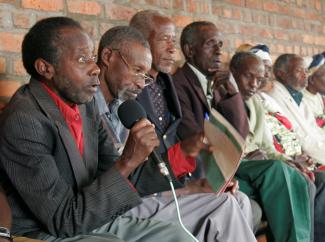Rwanda has made remarkable progress in rebuilding institutions of government, maintaining security, and promoting reconciliation since the 1994 genocide. However, concerns about democracy and governance remain, including highly centralized political power, nonexistent political opposition, weak civil society, and limited media freedom.
Active citizens are the wellspring of democratic accountability. USAID supports civil society to monitor and advocate for effective government services; increase citizen participation in decision-making; and build citizen capacity to advocate for responsive and fair government policies.
Women, youth, and other marginalized groups have low participation rates in government processes. USAID works with civil society in Rwanda to raise the voices of these groups to government leaders, and supports government efforts to address their concerns.
Many Rwandans, particularly rural populations, are unaware of their legal rights, or have no access to legal aid. USAID works to inform citizens of their rights, supports legal aid services for poor and marginalized communities, and encourages the use of alternative dispute resolution to increase access to justice.
The legacy of the genocide impacts every aspect of life in Rwanda. USAID stands with the people of Rwanda and supports trauma counseling, community dialogues, and reconciliation to rebuild the social fabric.
For more details about the program, please see our democracy and governance overview. For more information about specific activities, please select from the options below.

USAID/Rwanda
